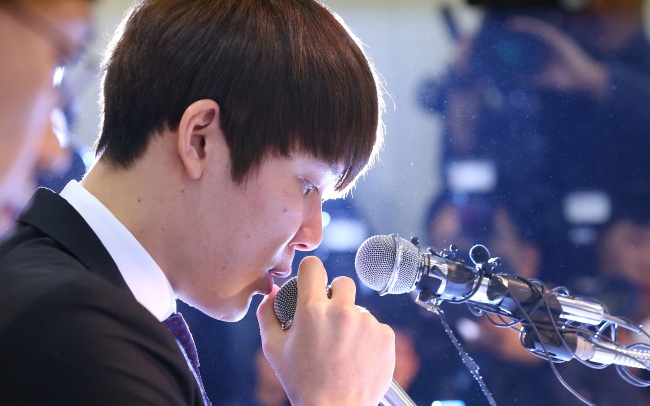Disgraced South Korean Olympic swimming champion Park Tae-hwan on Friday apologized to the public for his recent doping scandal, saying he was ashamed of himself for letting down so many people.
 |
| (Yonhap) |
Park held a press conference at a Seoul hotel, his first public appearance since FINA, the international swimming federation, handed down an 18-month suspension Monday after he’d tested positive for testosterone, a substance banned by the World Anti-Doping Agency (WADA).
FINA collected Park’s samples on Sept. 3 last year and his suspension began retroactively on that day. It will end on March 2, 2016.
Park, a national icon who remains the only South Korean with an Olympic swimming gold, had previously argued that a Seoul-based doctor had given him an injection without fully disclosing that it could contain a banned substance. The doctor was later indicted on charges of professional negligence and will stand trial next month.
On Friday, the 25-year-old reiterated that he’d been assured by the doctor in question that his injection would be clean, but acknowledged that it didn’t absolve him of his own responsibility.
“I’d like to apologize to the people for causing so much trouble with this unacceptable incident,” Park said, fighting back tears as he read from a statement.
“When I first learned of the test result, I felt something must have been wrong. But then I realized I should have been more careful. Regardless of reasons or processes, I think it’s my fault that things have come to this point.”
FINA also stripped Park of all medals earned after Sept. 3. The suspension cost Park six medals he’d captured at the Incheon Asian Games, when all swimming races were held at an arena bearing Park’s name. Three of those medals came in relays, and Park’s teammates in those races will lose their medals because of Park’s suspension.
Park said attending the FINA doping hearing on Monday was “by far the most difficult and nervous moment in my life.”
“Ever since I learned of the positive test (in November last year), I’ve been in a living hell,” he added. “I was hurt and devastated. Throughout my career, I never once resorted to drugs and never relied on anything other than training to compete. I wondered, ‘Why did something like this happen to me?’ I wished I could turn back the clock.”
Park also said he will willingly deal with any criticism hurled his way.
“Some people have asked me if I felt it unfair to be labeled a drug cheat, and others have encouraged me to come back even stronger than before,” the swimmer said. “And then there are those who think all the medals I’ve won so far are meaningless after this drug test. I will take everything to heart. I think it’s something I have to live with for the rest of my life.”
While his suspension will end before the start of the 2016 Olympics in Rio de Janeiro, it remains unclear whether Park, the first and only South Korean with an Olympic swimming medal, will be able to compete in his fourth Summer Games.
Under a rule instituted last July by the Korean Olympic Committee (KOC), an athlete who has been suspended for a drug-related offense is ineligible for any national team for three years, starting from the day the suspension ends.
Park’s situation has sparked debate over the potential double punishment of the KOC’s rule. Critics of the rule say Park shouldn’t be penalized for the same offense and that he deserves a second chance, given his contribution to the sport. On the other hand, there are those who believe Park shouldn’t receive any special treatment and the rule should be applied to all athletes equally.
Park said it was still premature for him to talk about his possible Olympic participation, saying he will first have to reflect on himself and keep a low profile for the time being. (Yonhap)



